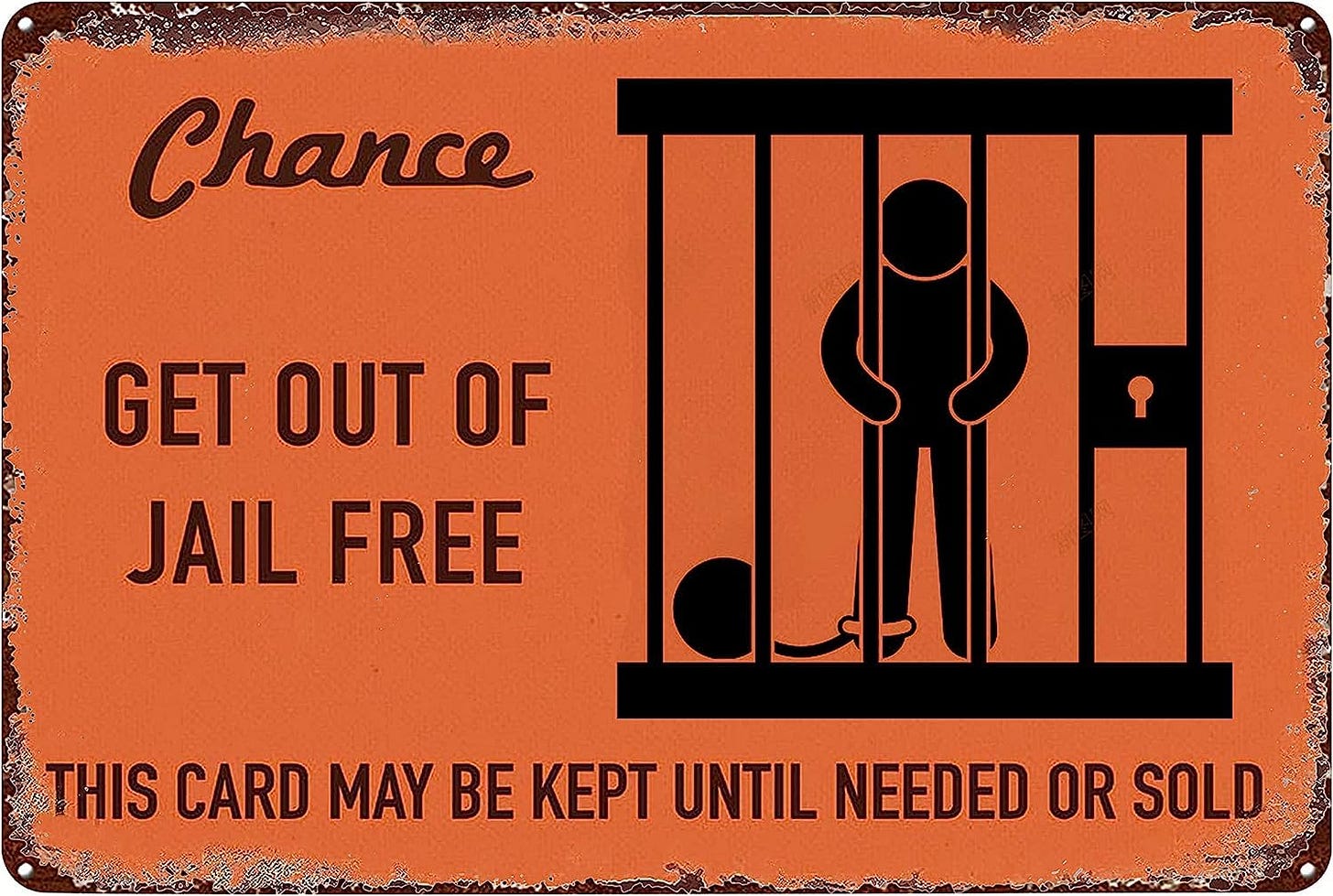Fellow lighthouses, in this free post at Thoughtful Enough we answer the question, Why should we care about some small provision referring to contempt citations in the middle of a thousand-page budget bill?
[Editing May 22 to update the bill’s status: The House of Representatives passed the bill 215-214, with 215 Republicans voting “aye” and two Republicans plus all 212 Democrats voting “no.” The bill may be modified during its consideration in the Senate. Keep nudging your Senators. -JG]
Congress seems to be trying to issue a “get out of jail free” card to itself and to the White House. Remember that Chance card from Hasbro’s “Monopoly” game? It only works in the game, of course. If you wind up in a real jail, that card won’t make your jailor open your cell door and let you go free… although, hmmm. Someone is selling a wall hanging of this card on Amazon,com so maybe he or she knows something I do not.
Our new president is leaning hard on Republican holdouts to pass what they call the “one big beautiful bill” act. A vote is pending in the House. The bulk of the bill concerns federal tax reform and budget provisions. That creates enormous pressure on members of Congress to pass it. A procedure known as reconciliation allows the Senate to pass a House bill with a simple majority, instead of 60 votes. Republicans can achieve a simple majority in both House and Senate without any bipartisan help.
There are other actions in the bill besides the budget. Some of its provisions might make you recoil, might make you wonder what sort of unconstitutional actions the White House and Congress have planned. I haven’t read it all, but I saw online a reference to one passage within the bill that troubles me. I think it might trouble you, too. Let’s shine our lighthouse beacons on it:
SEC. 70302. RESTRICTION OF FUNDS. No court of the United States may use appropriated funds to enforce a contempt citation for failure to comply with an injunction or temporary restraining order if no security was given when the injunction or order was issued pursuant to Federal Rule of Civil Procedure 65(c), whether issued prior to, on, or subsequent to the date of enactment of this section.
That’s on pages 562-563, at the conclusion of the seventh title (a.k.a. big chunk, or subsection) in the bill. The bill is 1,116 pages long in the quaint double-spaced, numbered-lines-of-text format of Congressional legislation. This “section 70302” text is the only place in the whole bill where the word “contempt” appears. It is designed to defang, declaw and generally neuter the judicial branch.
What is that Federal Rule of Civil Procedure 65(c)? Glad you asked: "(c) Security. The court may issue a preliminary injunction or a temporary restraining order only if the movant gives security in an amount that the court considers proper to pay the costs and damages sustained by any party found to have been wrongfully enjoined or restrained. The United States, its officers, and its agencies are not required to give security.”
We return to our initial question. Why should you care about some tiny provision referring to contempt citations in a thousand-page budget bill?
Civil contempt citations are the main “stick” courts can use to compel someone to comply with court instructions.
So, the “big beautiful bill” says, unless citizens seeking a restraining order against the government have set up some sort of escrow account to pay the damages suffered by the government (should the restraining order later be found to have been wrongful) then the court cannot spend a dime on a civil contempt citation for ignoring the restraining order. Notice that section 70302 doesn’t require the injunction or restraining order to be wrongful. It just says, if there is no escrow, there is no enforcing civil contempt. Also notice that it applies to court orders before, on the day of, or after the enactment of the bill. So Congress is establishing retroactive immunity to civil contempt citations.
Fellow lighthouses, if the bill passes, the government will be immune from civil contempt citations and can just ignore the courts who issue injunctions or restraining orders, unless the people making the initial complaint had set aside a huge chunk of money to pay the government’s costs of doing whatever business the complainers say should be restrained or enjoined.

You want to enjoin the folks at Immigrations and Customs Enforcement (ICE) so they cannot deport people without due process? Well, let’s see, here. Did you park enough dollars to cover the costs of ICE deportation actions… in advance… when seeking your injunction or restraining order? No? Too bad! The government can ignore the order and disallow federal dollars to pay for civil contempt citations, so the court has no power at all.
That’s not what the Constitution has in mind, with its Articles I, II, and III delineating the checks and balances among the branches of government.
What’s next in this process?
If the House passes this big bill, the Senate can opt to do likewise with a simple majority. Once the House and Senate vote in favor of it, the president will put Sharpie to paper quickly and sign it into law.
Wake up your representative in the House. Wake up your Senators. Have them delete section 70302 from the bill, or unite to block the bill. We only need a few Republicans in each chamber to say “no.”
If the bill becomes law, which could happen very very soon, we’ll need a subsequent bill repealing section 70302 or at least rewording it, so our courts retain civil contempt powers.
My previous Thoughtful Enough post recalled children’s television lessons in the “Schoolhouse Rock!” series. Here’s another in that 1970s batch, appropriate for today:





I've been suspicious of big, beautiful bills ever since Jefferson Smith took on the contingency bill that hid the dam on Willet Creek. This probably isn't the worst provision in the BBB, but is obscure and convoluted enough that it will probably be overlooked. Thanks for the explanation.